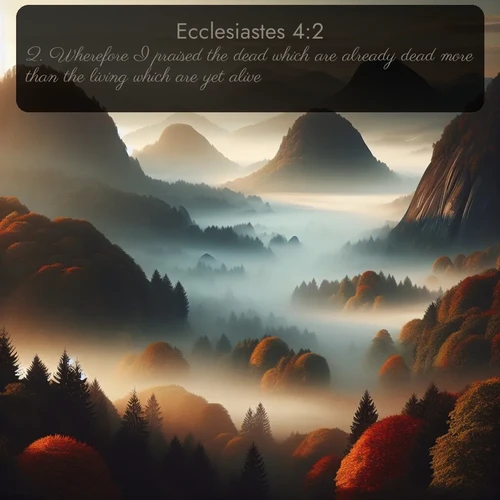Ecclesiastes 4:2 plusieurs versions / traductions
English Bible Translations
2. Wherefore I praised the dead which are already dead more than the living which are yet alive.
2. Wherefore I praised the dead that have been long dead more than the living that are yet alive;
2. So my praise was for the dead who have gone to their death, more than for the living who still have life.
2. Then I praised the dead who are already dead more than the living who are yet alive;
2. Wherefore I praised the dead who are already dead more than the living who are yet alive.
2. And I am praising the dead who have already died above the living who are yet alive.
German Bible Translations
2. Da lobte ich die Toten, die schon gestorben waren, mehr denn die Lebendigen, die noch das Leben hatten;
2. Da pries ich die Toten, die längst gestorben sind, glücklicher als die Lebenden, die jetzt noch am Leben sind.
French Bible Translations
2. J'ai alors déclaré que les morts sont plus heureux d'être déjà morts que les vivants d'être encore en vie,
2. Et j’ai trouvé les morts qui sont déjà morts plus heureux que les vivants qui sont encore vivants,
2. Et j'ai trouvé les morts qui sont déjà morts plus heureux que les vivants qui sont encore vivants,
2. C'est pourquoi j'estime heureux les morts qui sont déjà morts, plutôt que les vivants qui sont encore vivants,
2. C'est pourquoi j'estime plus les morts qui sont déjà morts, que les vivants qui sont encore vivants.
2. C'est pourquoi j'estime plus les morts qui sont déjà morts, que les vivants qui sont encore en vie;
Versions with Strong Codes
Ecclesiastes 4 / KJV_Strong2.
Strong Code definitions
H589 'aniy an-ee' contracted from H595; I:--I, (as for) me, mine, myself, we, X which, X who.see H595
H7623 shabach shaw-bakh' a primitive root; properly, to address in a loud tone, i.e. (specifically) loud; figuratively, to pacify (as if by words):--commend, glory, keep in, praise, still, triumph.
H853 'eth ayth apparent contracted from H226 in the demonstrative sense of entity; properly, self (but generally used to point out more definitely the object of a verb or preposition, even or namely):--(as such unrepresented in English). see H226
H4191 muwth mooth a primitive root: to die (literally or figuratively); causatively, to kill:--X at all, X crying, (be) dead (body, man, one), (put to, worthy of) death, destroy(-er), (cause to, be like to, must) die, kill, necro(-mancer), X must needs, slay, X surely, X very suddenly, X in (no) wise.
H7945 shel shel for the rel. 834; used with prepositional prefix, and often followed by some pronominal affix; on account of, whatsoever, whichsoever:--cause, sake.see H834
H3528 kbar keb-awr' from H3527; properly, extent of time, i.e. a great while; hence, long ago, formerly, hitherto:--already, (seeing that which), now.see H3527
H4191 muwth mooth a primitive root: to die (literally or figuratively); causatively, to kill:--X at all, X crying, (be) dead (body, man, one), (put to, worthy of) death, destroy(-er), (cause to, be like to, must) die, kill, necro(-mancer), X must needs, slay, X surely, X very suddenly, X in (no) wise.
H4480 min min or minniy {min-nee'}; or minney (constructive plural){min-nay'}; (Isaiah 30:11); for H4482; properly, a part of; hence (prepositionally), from or out of in many senses (as follows):--above, after, among, at, because of, by (reason of), from (among), in, X neither, X nor, (out) of, over, since, X then, through, X whether, with.see H4482
H2416 chay khah'-ee from H2421; alive; hence, raw (flesh); fresh (plant, water, year), strong; also (as noun, especially in the feminine singular and masculine plural) life (or living thing), whether literally or figuratively:--+ age, alive, appetite, (wild)beast, company, congregation, life(-time), live(-ly), living (creature, thing), maintenance, + merry, multitude, + (be) old, quick, raw, running, springing, troop.see H2421
H834 'aher ash-er' a primitive relative pronoun (of every gender and number); who, which, what, that; also (as an adverb and a conjunction) when, where, how, because, in order that, etc.:--X after, X alike, as (soon as), because, X every, for, + forasmuch, + from whence, + how(-soever), X if, (so) that ((thing) which, wherein), X though, + until, + whatsoever, when, where(+ -as, -in, -of, -on, -soever, -with), which, whilst, + whither(- soever), who(-m, -soever, -se). As it isindeclinable, it is often accompanied by the personal pronoun expletively, used to show the connection.
H1992 hem haym or (prolonged) hemmah {haym'-maw}; masculine plural from H1981; they (only used when emphatic):--it, like, X (how, so) many (soever, more as) they (be), (the) same, X so, X such, their, them, these, they, those, which, who, whom, withal, ye. see H1981
H5728 `aden ad-en' or radennah {ad-en'-naw}; from H5704 and 2004; till now:--yet.see H5704 see H2004
H2416 chay khah'-ee from H2421; alive; hence, raw (flesh); fresh (plant, water, year), strong; also (as noun, especially in the feminine singular and masculine plural) life (or living thing), whether literally or figuratively:--+ age, alive, appetite, (wild)beast, company, congregation, life(-time), live(-ly), living (creature, thing), maintenance, + merry, multitude, + (be) old, quick, raw, running, springing, troop.see H2421
Prédications qui analysent les thèmes Ecclésiaste 4
Thèmes : Inutilité des efforts ; Solitude de l'homme ; Valeur de l'amitiéRelated Sermons discussing Ecclesiastes 4
Themes : Inutilité des efforts ; Solitude de l'homme ; Valeur de l'amitiésee also: Bible Key Verses ; KJV Bible Images, BBE Bible images

